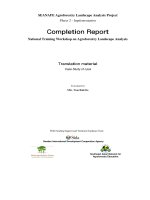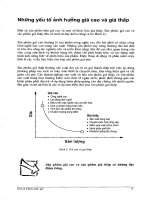Anh 7
Bạn đang xem bản rút gọn của tài liệu. Xem và tải ngay bản đầy đủ của tài liệu tại đây (138.47 KB, 8 trang )
<span class='text_page_counter'>(1)</span><div class='page_container' data-page=1>
Date of preparing: 6/6/2020 Period 82
<b>Unit 15: Going out</b>
<b>Lesson 2: A</b>
<b>2</b><b>A.Objectives</b>
<b>* Knowledge</b>
<b>- </b>To know about video games and some disadvantages of playing video games.
<b>* Skill</b>
- Practice the comprehension reading skill.
<b>* Attitude</b>
- Help ss to have good consciousness in order to practice read for detalis, doing
some exercises.
<b>B. Teaching- aids</b>
T: Lesson plan, textbooks, pictures, poster.
Ss: Book, notebook, pen…
<b>C. Methods</b>
- Model-Talk-Practice, individual work, pair work
- Some techniques can be used: Chatting, T/ F statement prediction, Matching,
Multiple choice.
<b>D. Contents</b>
<b>I. Organization (1’)</b> - Greeting
- Checking attendance
Class Date of teaching Absent students
7A 22/04/2019
7B
<b>Teacher & students’ activities </b> <b>Contents</b>
<b>II. Warm up (5')</b>
* Chatting
- Show a picture and ask students
some questions
- Introduce the new lesson
<b>III. New lesson (35’)</b>
<b>Activity 1: Pre - reading(15')</b>
<i>1. Vocabulary</i>
Elicit the words from students
(mime)
(translation)
(definition: A person who
* Chatting:
“What is he doing ?”
“Do you often play video games ?”
“How often do you go there ?”
“Do you spend a lot of money ?”
<b>1. Vocabulary</b>
- <b>di</b>zzy (adj): choáng váng, hoa mắt
- <b>so</b>cial skill (n): kỹ năng giao tiếp
- in<b>ven</b>tor (n): nhà phát minh
</div>
<span class='text_page_counter'>(2)</span><div class='page_container' data-page=2>
invents something)
(example)
(example/ translation)
(translation)
- Sts listen.
- Listen and repeat (chorally then
individually).
- Copy.
Check:<b> what and where</b>
2. True/ False statements prediction
* Set the scene: Some young people
play video games. You will read
some opinions about playing video
games
- Ask students to read the statements
(on poster) and work in pairs to
predict theyare true or false
- Give feedback.
<b>Activity 2: While Reading(10’)</b>
1. Reading and Checking
- Ask students to open their books
and read the text on page 147.
- Let students check their prediction.
- Give feedback
Key: 1. T 2. F 3. T 4. F 5. T
2. Matching
- Ask ss read A2 again to match.
3. Multiple choice (A2 P. 148-149)
- Ss work in groups of 6 to do A3 on
the posters.
- T checks and corrects.
<b>Activity 3: Post Reading(10’)</b>
Gap fill A3 P. 149
- Have students complete the passage
- Ask them to exchange the results
with the partners.
- Call on some Ss to give the answer
in front of the class
- Correct and give the key
- <b>ro</b>bbery (n): vụ cướp
<b>2. True/ false statements prediction</b>
a. Children like playing video games
because they are good fun
b. It is very good for children to spend too
much time on their own
c. Playing video games for a long time will
make children become dizzy
d. Children mustn’t play outdoors with their
friends
e. Some inventors become rich when they
are very young
<b>3. Read</b>
* Answer keys:
a. True; b. False; c. True; d. False; e. true
* Correction:
b. It is very bad for children to spend too
much time on their own
d. Children should play outdoors with their
friends
* Matching:
Careful Chơi ngoài trời
Develop Quên
Take part in Cẩn thận
Play outdoors Phát triển
Forget Tham gia
* Answer keys:
a. D: Many young people play video games
b. A: Some inventors of video games
become very rich
c. D: The doctor thinks all children should
take part in outdoor activities with their
friends
d. B: The doctor says you should spend
little time playing video games
<b>*</b>Gap fill
<i>Key:</i>
</div>
<span class='text_page_counter'>(3)</span><div class='page_container' data-page=3>
3. is 4. identify
5. are 6. use
7. can 8. will
9. buy 10. show
<b>IV. Summary ( 2’): - </b>What would you like …..? question and answer
<b> -</b> I’d like to watch… to talk about your favorite TV Programs
<b>V. Homework ( 2’): - </b>Study the lesson
<b>-</b> write the dilogue in the exercise book( their own dilogue)
<b>-</b> Prepare the new lesson: Unit 14: A3
<b>E. Evaluation:</b>
………
………
………
………
……...…
Date of preparing: 6/6/2020 Period 83
<b>UNIT 15 :GOING OUT</b>
<b>LESSON 3 :</b> <i><b>B1</b></i>
<b>A.Objectives</b>
<b>* Knowledge</b>
<b>- </b>After the lesson students will be able to know about life in the city and life in the
country.
<b>* Skill </b>
- Practice 4 skills: listening, reading, speaking and writing.
<b>* Attitude</b>
- Help ss to have good consciousness in order to practice read for detalis, doing
some exercises.
<b>B. Teaching- aids</b>
T: Lesson plan, textbooks, tape, cassette, Pictures about the city and the country
Ss: Book, notebook, pen…
<b>C. Methods</b>
- Model-Talk-Practice, individual work, pair work
- Some techniques can be used: Brainstorming, asking and answering, pairwork,
groupwork
<b>D. Contents</b>
</div>
<span class='text_page_counter'>(4)</span><div class='page_container' data-page=4>
- Checking attendance
Class Date of teaching Absent students
7A
7B
<b>Teacher and SS' activities</b> <b>Contents</b>
<b>II. WARM UP</b><i> (5 ') </i>
H R O B H G I E N
O C L U B Z W S C
O Z K S J V Q I E
D R S Y M N T O G
M Z J R K Y T N A
O P C O Q Z E J L
T T R A F F I C L
O X L D R N U B I
R B I K E S Q K V
- Ask students to find the words which relate to the
city and country.
- Have students work in groups.
- Ask students some questions such as:
+ Do you like to live in the city or in the country?
Why / why not ?
- Remark and lead in new lesson .
<b>III. NEW LESSON</b> <b>(35')</b>
<b>Activity 1: Pre - reading(15')</b>
<b>1. Vocabulary </b>
Sts : - listen.
- listen and repeat (chorally then individually).
- copy.
Check: R.O.R
<b>2. Brainstorm</b>
find the words which relate to
the city and country .
- work in groups .
<b>1. Vocabulary </b>
- The rest ( n ): phần còn lại
- awake ( adj ): thức giấc
- scare ( v ): sợ
- hate ( v ) = to dislike: ghét
- get used to + n: quen với
Life in the
</div>
<span class='text_page_counter'>(5)</span><div class='page_container' data-page=5>
T puts the topic on the board
- Ask ss to find out the words belongs the topic
- SS work in pais
- ask ss to compare with each other
- T gives feedback
<b>Activity 2 : While - reading(10')</b>
<b>1. Checking predicton</b>
- Ss read the text and add some more information
-read and check prediction
<b>2. Comprehension questions</b>
Lucky numbers
1. Where did Hoa live before ?
2. Why doesn’t Hoa like the city ?
3. LN.
4. What does Hoa do in the evening?
5. What does Hoa dislike most in the city? Why?
6. Does She like the city?
7. LN
8 . Why did Hoa like living in a village in Hue?
<b>Activity 3: Post - reading</b>(10')
- Ask students to use the questions in part B2 to
work in pairs discussing about life in the city and
life in the country.
- Have students work in pairs.
- Call on some pairs to practice in front of the class.
- Correct and remark.
<b>2. Reading</b>
<i><b>Comprehension questions</b></i>
1.She lived in a village near
Hue.
2.Because the city is noisy and
the roads are busy.
4.She goes to the school theater
club once a week. The rest of
the week she usually stays at
home in the evening.
5.Hoa dislikes crossing the
road most because there are
bikes, motorbikes and cars
coming from every direction
and they scare her.
<b>3. Practice</b>
<b>IV. SUMMARY </b> (2')
- The differences between city life and country life.
<b>V. HOMEWORK </b><i>(2') </i>
- Learn by heart new words by writing 3 lines for each
- Write the answers in part B2 in the exercise books.
- Prepare part B3,4
<b>E.Evaluation</b>
</div>
<span class='text_page_counter'>(6)</span><div class='page_container' data-page=6>
Date of preparing: 6/6/2020 Period: 84
<i><b>Unit:16</b></i><b> PEOPLE & PLACES</b>
<b>Lesson3 : FAMOUS PEOPLE ( B1 + B2)</b>
<b>I . Objectives : </b>
- By the end of the lesson, Ss can talk about famous people
<b>II . Language contents:</b>
- Vocabulary: quiz, defeat
- Grammar: Review : adjective and adverb
<b>III . Teaching aids :</b>- pictures. Sub- board, rub out and remember. Slap the board.
<b>IV. Procedure :</b>
<b> Stages And activities</b> <b>Contents</b>
<b>1 .Warm up:</b> slap the board
<b>+</b> slap on the words teacher read
<b>2. Presentation:</b>
- ask ss some questions about the famous
people
+ answer.
- Set situation , read the dialogue and
give out some new words then practice
them
+ listen , repeat and copy down and
practice vocabulary
* Checking: Rub uot and remember
<b>3. Practice :</b>
<b>- </b>play the tape
+ listen and read
+ practice dialogue in pairs
Slap the board:
- destination, attraction, ancient, monument,
Buddhist , Shadow
1. Do you know My Tam?
2. What does she do ?
3. Do you Trinh Cong Son ?
4. What does he do ?
5. Do you know pele?
6. What does he do ?
7. Do you know Vo nguyen giap?
8. what does he do?
<b>B1. Listen . Then practice with a partner.</b>
<b>* Vocabulary</b>
- quiz ( n)( explanation): câu đố
- defeat( v) (trans): đánh bại
- General( n): đại tướng
- Commander- In – Chief: tổng tư lệnh
- force( n)(translation):lực lượng, sức mạnh
- battle( n)( example): trận chiến đấu
- People’s Army of Vietnam: Quân đội nhan
dân VN
<b>1. Practice reading dialogue.</b>
</div>
<span class='text_page_counter'>(7)</span><div class='page_container' data-page=7>
+ work in pairs, check the right column.
- set situation and ask ss to complete
dialogue then practice them.
+ do the task in pairs
- guide ss to make dialogue using the
words given in the box.
+ work in paies, then present before
class.
<b>4.Production:</b>
- tell one or two famous people
+ make dialogue about them
<b>5. Homework</b>
-+ study the leson
+ do the exercise B1B2( work book)102
+ prepare unit 16: B4,B5+ Remmember
*. Check the right column and correct the false
sentences.
a. F. Liz knows nothing about General Giap.
b. F. The people’s Army of Vietnam defeated
the French in 1954.
c. T
d. F. General Giap was born in 1911.
e. T
f. F. Ba will lend Liz some history book.
<b>B2. Practice</b>
a. Complete this dialogue with the words in the
box.
1. like
2. prefer
3. guess
4. favorite
b. Make your own dialogues about famous you
know.
Clever powerful strong gentle kind
Pretty handsome funny fast
<b>-</b> Hồ Ngọc Hà
</div>
<span class='text_page_counter'>(8)</span><div class='page_container' data-page=8></div>
<!--links-->









